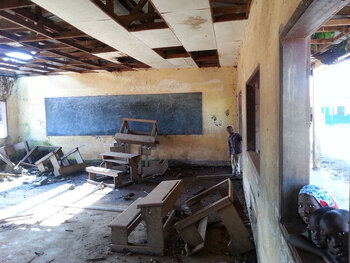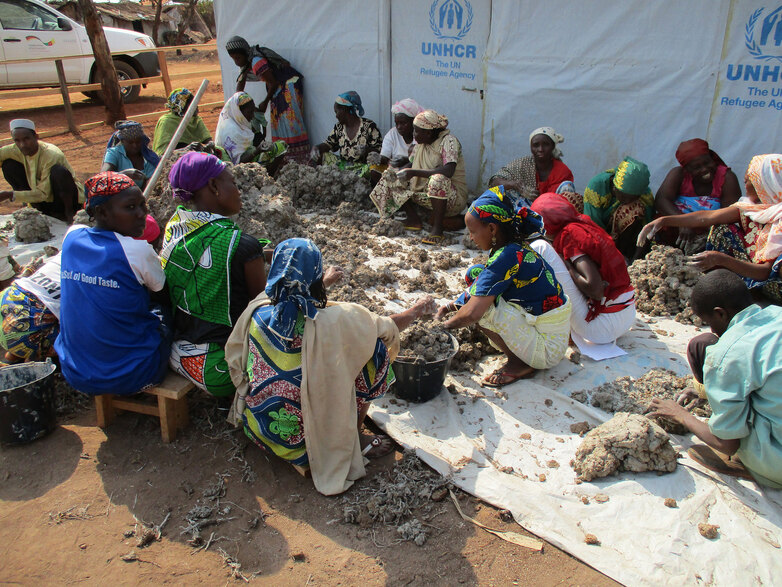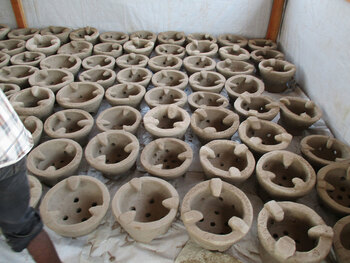Greater cohesion between neighbours
Project description
Project title: Reducing Vulnerability to Crises – Supporting Refugees and Host Communities
Commissioned by: German Federal Ministry for Economic Cooperation and Development (BMZ) Special Initiative ‘Tackling the root causes of displacement – reintegrating refugees’
Country: Cameroon, Chad, Central African Republic
Lead executing agency: Cameroon: Ministry of Economy, Planning and Regional Development; Chad: Ministry of Economy, Planning and International Cooperation
Overall term: 2014 to 2017

Context
The Central African Republic is one of Africa’s poorest countries. Since 2013, it has been convulsed by a sustained political crisis, with repeated outbreaks of violence between Christian militias and Muslim rebels. Thousands of people have died in the conflict, while administrative and security structures have largely collapsed.
The threats to human life and a shortage of food have driven the often destitute people to flee their homes and seek refuge. About 450,000 internally displaced people and the same number living as refugees in neighbouring countries pose enormous challenges for their host communities. Local and national authorities are unable to cope with this situation alone.
Some 275,000 people from the Central African Republic have already fled to eastern Cameroon, with many settling near villages rather than in reception camps. A further 110,000 have fled to southern Chad. Moreover, 80,000 people of Chadian origin, whose communities have lived in the Central African Republic for generations, have also been forced back to their country of origin. Neither these returnees nor the new arrivals are welcome in Chad. Conflicts break out repeatedly with the local communities over land rights or access to water, firewood, food, education and health. To avoid an escalation of the situation, there is a need to improve the living conditions of all those affected, and to meet their basic needs.
Objective
Living conditions have improved for the refugees and returnees, as well as the local populations of the host areas and home communities.

Approach
The Deutsche Gesellschaft für Internationale Zusammenarbeit (GIZ) GmbH is working on behalf of the German Federal Ministry for Economic Cooperation and Development (BMZ) to support host communities that are being overwhelmed by the influx of refugees from the Central African Republic.
The project provides training and support to state institutions in the affected regions of Cameroon, Chad and the Central African Republic, enabling them to address the needs of refugees and pursue conflict resolution strategies.
Schools are being rebuilt, and improvements made in terms of health infrastructure and access to water. To reduce conflicts over scarce firewood, the project is working with a local sawmill to provide alternative fuel using woodchips and sawdust, and it is distributing energy-efficient stoves to refugees and members of the host communities.
Meetings and dialogue between the different groups contribute to peaceful coexistence and the non-violent resolution of conflicts. GIZ is also supporting people who return to the Central African Republic in reconstructing the basic infrastructure of their home communities and in securing livelihoods. Cross-border initiatives for the Central African Republic are being developed and implemented from Chad and Cameroon.
Results achieved so far
Many of those fleeing from the Central African Republic have sought refuge in northern and eastern Cameroon. The project has improved the general hygiene conditions in these host communities by building or refurbishing 115 wells for drinking water, as well as 30 hand-washing stations and 26 latrines. To ensure that these measures are sustainable, it has so far carried out 26 training courses to better equip municipal employees for the management of the water points. In future, 36 special well committees will oversee the allocation of drinking water to the mostly Muslim refugees and the local Christian population.
The project is also upgrading 40 schools and equipping classrooms with benches. A hospital and five ambulances have improved local health care, benefiting both the refugees and the host communities. Refugees and locals helping with the construction work all receive a salary, which enables them to earn a living.

In nine host communities of eastern Cameroon, the project also supports the provision of therapy and organises discussion groups for people who have experienced particularly severe violence. Some 23 individuals have received training in psychosocial support enabling them to work, in particular, with traumatised women and girls.